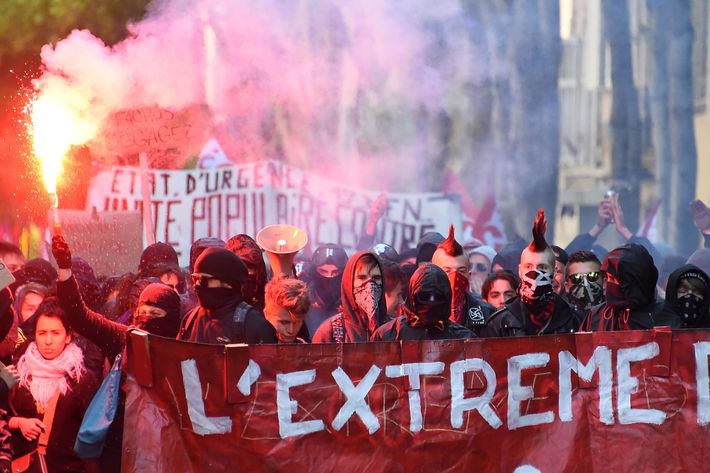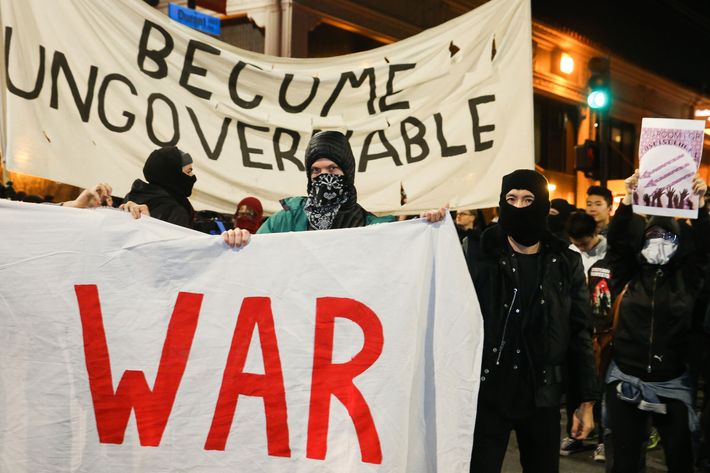
The sudden confluence of the British and French elections gives us, it seems to me, a front-row seat to the future of Western politics. In some ways, the campaigns reflect the last, turbulent American one. The choice in both countries is between versions of a Sanders, a Clinton, a Cruz, and a Trump. In France, old-school socialism has surged back in the candidacy of Jean-Luc Mélenchon; Clinton/Blair-style neoliberalism has found a fresh, young, empty candidate, Emmanuel Macron (whom Obama just called yesterday); the traditional Cruz-style Republican is François Fillon, now rising; and the reactionary populist is, of course, Marine Le Pen, waning a little, but still in the lead. The polls are currently showing a four-way close race in the first round, just like the primaries in the U.S. And the second round, on current polling, would be a Macron-Le Pen showdown on May 7 — an exact echo of Clinton-Trump, except that Macron appears to be charismatic and halfway competent.

In Britain, it’s a little more complicated because the Tory Party has somehow managed to hold together a coalition of mainstream conservatives and neo-reactionaries, but with the neos now in charge, empowered by the Brexit result. The Tories have essentially decided that they might as well go for it. If May waffled on this, her party would implode. And if she’s going to negotiate an exit, and keep the country with her, she’ll need a big majority in Parliament to bargain hard with the Europeans, and to crush any remnants of pro-EU resistance in the Commons and the House of Lords (which has a sizable pro-EU majority and can throw a spanner into the works). The Daily Mail front page the day after the news of an early election was a classic: “Crush the Saboteurs.” The prime minister may have been quietly for Remain, but she’s a hard Brexiteer now. (A good rule of British politics: Never underestimate the Tory Party’s desire for power. They’ll shift positions in a heartbeat if they have to, and their blood is much colder than anyone else’s.) Unlike the Trumpeteers, the Tories have managed to channel populism into reasonably credible government, under a traditional, experienced pol like Theresa May. And that’s why they’re a whopping 20 points ahead of their 20th-century rivals, the Labour Party.
And when you look at Labour, it’s even more dispiriting than the Democrats. The party has essentially fallen apart under a Sanders-style leader, Jeremy Corbyn — a transatlantic warning sign to those who still feel the Bern. It’s hard to overstate Corbyn’s unpopularity outside Britain’s young, progressive left (and old-school socialists among the union bosses). If asked to choose between the two major-party leaders, May or Corbyn, Brits currently prefer May by 53–15 percent. To rub it in, even many Labour members of Parliament agree, and have been trying, without success, to oust their pitiful leader for some time now. The result is an internal cleavage so deep and so bitter it may mean the end of the Labour Party for good — especially since it has lost almost all of Scotland to the secessionists. The Blair-Cameron centrist legacy, meanwhile, staggers on with the Liberal Democrats, led by the lightweight Tim Farron. The Lib Dems are trying to leverage pro-EU sentiment to win the votes of the 48 percent of Brits who voted to remain last June. Most likely, they’ll split the anti-Tory vote in half. It isn’t pretty.
But for me, the key thing to watch is whether the reactionary wave is in any way past its peak. In Britain, a huge parliamentary majority for Brexit could shift the internal balance decisively toward the new nationalism. But France may be the more telling. There are a lot of undecideds, and Le Pen has been upping the ante in the closing stretch. Her campaign slogan — “On est chez nous!” or “This is our home!” — is almost as inspired as MAGA. Mélenchon, in contrast, seems like a retread of the 1970s, Fillon of the ’80s, and Macron of the ’90s. The deep sense of a crisis of national identity — the merger with the rest of Europe, the influx of immigrants, especially Muslims — remains very much 2017. Scott McConnell has a vivid description of a recent rally in which Le Pen was on Trump-level form: “In France we drink wine whenever we want. In France we do not force women to wear the veil because they are impure. In France we get to decide who deserves to become French!” She went on, in her deep voice, to pledge that we will not be “dispossessed of our history, our memory.” I would not bet against the emotions that kind of rhetoric evokes.

But we’ll soon see, won’t we?
I’m happy to say that, the week after Easter, the Free Speech Movement just rose from the dead! Yesterday afternoon, Berkeley reversed itself and decided, after all, that it would allow Ann Coulter (I know) to speak on campus. The day before, they said they couldn’t guarantee the safety of the speaker or of those wanting to hear her — and so canceled the event scheduled for next Thursday. They were afraid of riots like those that followed Milo Yiannapoulos’s attempted talk at the college in February, when well over a thousand protesters filled the plaza that had once been the birthplace of the Free Speech Movement, with the chants of “No safe space for racists” and “This is war!” Barriers were torn down, fires lit, new construction vandalized. Among the protesters were masked members of an anarchist group, who pioneered the violence. Yiannapoulos’s speech was canceled, hours before it was due to begin. Coulter’s was canceled a week before hers was scheduled. Coulter said she’d go anyway — “I was invited to speak, so I’m going to go speak. We’ll see, maybe they’ll arrest me” — and now it’s on again for May 2 (if Coulter agrees the new date, anyway). Berkeley will probably have to be swamped with police to avoid another debacle. “Our job is to stabilize the situation,” said Captain Alex Yao of the university police department, “and to minimize chaos.”
That’s where we are on college campuses today: minimizing chaos. The symbolism of Berkeley makes it all the more poignant. Berkeley was where the Free Speech Movement began a little more than 50 years ago, when one student refused to obey the college administration’s policy that airing off-campus political issues — like the question of civil rights — was prohibited on campus property. His was a left-wing protest, now seen by many as the beginning of the countercultural youth movement of the 1960s. And it became an iconic moment in American educational history. When the police came to arrest the student, a vast crowd of up to 3,000 surrounded the police car, and prevented it from moving for the next 32 hours — with no riots and no violence, just physical weight. In fact, speeches were given atop the car itself! The students simply insisted that they be allowed to say whatever they thought on campus, regardless of university policy — and beyond the mainstream of the Democratic and Republican Parties, if they so wished. They wanted to challenge the very basis of American society and culture. They wanted the right to speak their minds, regardless of whom they offended. And they were prepared to go to jail to defend this principle. Hundreds did, in the protests that followed.

You have to think about those left-wing students today, as so many of their successors focus not on opening up a space for free speech of any kind, but on policing it with ever more diligence. The Coulter Kampf followed the mob attack on Charles Murray and his host, professor Allison Stanger, at Middlebury College, who is still in physical therapy for the concussion she suffered. It happened immediately after the successful sabotage of another talk scheduled to be given by Heather Mac Donald at Claremont McKenna College, in California, earlier this month. A student mob there did not gather to defend her right to speak, but rather to make sure she couldn’t.
The campus left, having once pioneered the idea of free speech, is now, sad to say, its most dedicated foe. And this is not some random student foolishness. It’s the logical consequence of an ideology actively taught and encouraged by faculty at elite colleges all over the country: that the power structures of a racist-sexist-ableist-queerphobic etc. society are so oppressive that non-p.c. speech is the equivalent of violence, and so must be shut down. The very existence of marginalized people is allegedly at stake.
Check out this recent staff editorial at the Wellesley News. It draws an explicit distinction between “free speech” and what it calls “hate speech.” The former is fine, the latter impermissible. How does the editorial define “hate speech”? “Racism, sexism, homophobia, Islamophobia, transphobia or any other type of discriminatory speech.” Oppose affirmative action? Free speech denied. Challenge the subjugation of women in Islam? Ditto. Support a traditionalist view of marriage? Silence the bigot! Wellesley’s student journalists argue, moreover, that they are not being intolerant. They insist they are in fact in favor of free speech and quite forgiving of contrary views. Behold the compassion: “Mistakes will happen and controversial statements will be said … It is vital that we encourage people to correct and learn from their mistakes rather than berate them for a lack of education they could not control.” But there are, of course, limits. If you persist in your error, and are not successfully re-educated, “then hostility may be warranted.” That includes anyone who supports “racist politicians or pay[s] for speakers that prop up speech that will lead to the harm of others.” The latter category is so vast and vague it would essentially ban the speech of anyone who supported the campaign of our current president, i.e., 46 percent of the country.
Or see this student petition to prevent any disciplinary action against students who shut down the Murray event at Middlebury: “Punishing protest is silencing dissent. Middlebury College must instead recognize and work to end its complicity in and perpetuation of systems of oppression.” Of course, disciplinary actions being taken against students were not against their right to protest, but their successful bid to shut down a guest speaker’s talk altogether. Or check out this open letter by students at Pomona College, after the Heather Mac Donald debacle. The letter was in response to the following statement by Pomona’s president, David Oxtoby: “Protest has a legitimate and celebrated place on college campuses. What we cannot support is the act of preventing others from engaging with an invited speaker. Our mission is founded upon the discovery of truth, the collaborative development of knowledge and the betterment of society.”
The discovery of truth? “Historically, white supremacy has venerated the idea of objectivity,” the students write, “and wielded a dichotomy of ‘subjectivity vs. objectivity’ as a means of silencing oppressed peoples. The idea that there is a single truth — ‘the Truth’ — is a construct of the Euro-West that is deeply rooted in the Enlightenment, which was a movement that also described Black and Brown people as both subhuman and impervious to pain.” Recall the statement recited by the Middlebury mob? It rang a very similar bell: “Science has always been used to legitimize racism, sexism, classism, transphobia, ableism, and homophobia, all veiled as rational and fact, and supported by the government and state. In this world today, there is little that is true ‘fact.’” And so the very idea of a university — a place where good ideas chase out bad ones — is now the equivalent of racism.
We got a reprieve last week. I fear, given the ideology being taught by the faculty on so many elite colleges, it will not last for long.
Good news on the legal-weed front. If Jeff Sessions and John Kelly want to reboot the war on dope, they are throwing themselves into a wood chipper of public opposition. Support for legal cannabis is now at a record 61 percent of Americans, in a new CBS poll. (Gallup had it at 60 percent last October.) That’s up from 12 percent in 1969 and 35 percent as the new millennium dawned. Women now favor legal weed as much as men do; and only the over-65s — like Trump, Sessions, and Kelly — are in opposition. It remains an indelible shift of the Obama era, like support for gay rights. I’ve become immeasurably depressed by the attempt not to reform but to reverse so much of Obama’s legacy under Trump. But some deep cultural shifts are not changing at all — they are, if anything, entrenching themselves in the mainstream consensus. It seems in this case as if the actual science — that marijuana is less damaging to the body and mind than alcohol, and actually makes life better for millions — has won the day. Reason can indeed triumph eventually over prejudice. Score one for liberal democracy, the truth, and the Enlightenment! Or as I used to say, know hope.





























